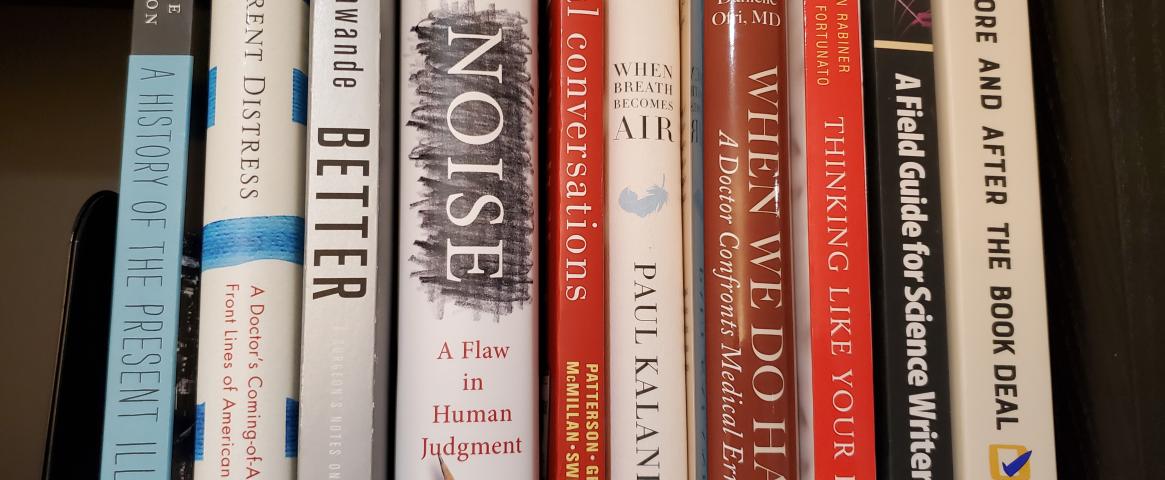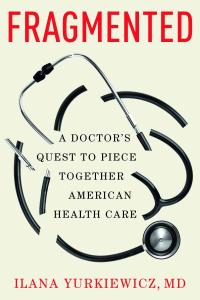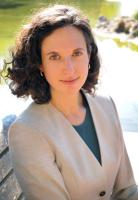
Ilana Yurkiewicz, MD—Fragmented: A Doctor’s Quest to Piece Together American Health Care
TO PIECE TOGETHER AMERICAN HEALTH CARE
Ilana Yurkiewicz, MD
W.W. Norton, July 11, 2023, Hardcover $30.00, Kindle $14.99
ISBN-13: 978-0393881196
ASIN: B0BHPRM3Y4
Yurkiewicz reports:
It may sound cheesy, but my book found me. I’ve been a practicing doctor for nearly a decade. I fully expected that medicine would involve uncertainty because human life is uncertain. Instead, I battle a different kind of uncertainty: having to take care of patients without knowing their complete medical history. I’ve spent countless hours hovering over fax machines and sleuthing through charts, grasping at bits and pieces of a patient’s narrative to try to craft a coherent whole.
A few years before I wrote my book, I published an article on fragmented medical record-keeping. I realized then that records are just the tip of the iceberg. There is a broader story: Our medical system keeps doctors from seeing their patients’ full narratives. I began listing the obstacles: Clunky electronic patient charts. An insurance maze that deprioritizes follow-up. A culture of specialization. Fragmentation undermines health care.A few literary agents had contacted me during my medical journalism career, so I reached back out and connected with one of them. I wrote my book interspersing patient narratives, critical analysis, and research. I am fortunate that my job gave me a front-row seat to the narrative component, based on real medical scenarios with details changed to protect privacy.
My first piece of advice to anyone writing a science book is to look into hiring a fact checker. When you write over 75,000 words, you likely will make mistakes. I thought it crucial to have another set of eyes verifying my statistics and re-interviewing my sources. Publishers typically do not provide fact checking. I believe it’s worth it to hire a fact checker and pay from your advance.
A second bit of advice is to do the hard work of organizing your book upfront. Don’t gloss over your book proposal as simply your passport to the book deal. Your first book is probably your longest writing by far. It’s easy to get lost. I gave a lot of thought in my proposal to structure. I decided to group my chapters into three sections, outlined what each chapter would say, and deliberated how they would fit together. A year later, I was glad I gave myself that blueprint.
Contact info:
- Ilana Yurkiewicz: ilana.yurkiewicz@gmail.com, https://ilanayurkiewicz.com/, @ilanayurkiewicz
- Book: https://wwnorton.com/books/9780393881196, https://ilanayurkiewicz.com/book
- Publicist: Gabby Nugent, gnugent@wwnorton.com
- Agent: William Callahan, william@inkwellmanagement.com
NASW members: will your book be published soon? Promote it by submitting your report for Advance Copy.
Tell your fellow NASW members how you came up with the idea for your book, developed a proposal, found an agent and publisher, funded and conducted research, and put the book together. Include what you wish you had known before you began working on your book, or had done differently.
See https://www.nasw.org/advance-copy-submission-guidelines.
View Advance Copy archives at https://www.nasw.org/member-article/advance-copy.
Thinking of writing a book? If you are a NASW member, you may access a list of more than 200 books and online resources to help you craft your book proposal, find an agent and funding sources, negotiate your contract, learn about self-publishing, publicize and market your book, and more at https://www.nasw.org/article/write-book.
Send book info and questions about book publishing to Lynne Lamberg, NASW book editor, llamberg@nasw.org.
Follow @LynneLamberg on Twitter for news about science/medical books, writing, and NASW authors.
Banner image adapted from original photo by Ilana Yurkiewicz.
NASW members: Share photos of your office bookshelves for use on our website. Upload photos to bit.ly/naswpicsubmit.
Advance Copy
The path from idea to book may take myriad routes. The Advance Copy column, started in 2000 by NASW volunteer book editor Lynne Lamberg, features NASW authors telling the stories behind their books. Authors are asked to report how they got their idea, honed it into a proposal, found an agent and a publisher, funded and conducted their research, and organized their writing process. They also are asked to share what they wish they’d known when they started or would do differently next time, and what advice they can offer aspiring authors. Lamberg edits the authors’ answers to produce the Advance Copy reports.
NASW members: Will your book be published soon? Visit www.nasw.org/advance-copy-submission-guidelines for information on submitting your report.
Publication of NASW author reports in Advance Copy does not constitute NASW's endorsement of any publication or the ideas, values, or material contained within or espoused by authors or their books. We hope this column stimulates productive discussions on important topics now and in the future as both science and societies progress. We welcome your discussion in the comments section below.





